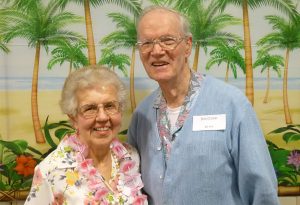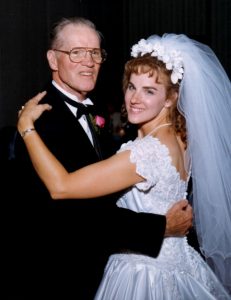Seniors remaining at home: The conversation we never had
By Lynne Conner for Chronicle Media — November 14, 2017
Lynne Conner’s parents —Theresa and Robert Ditzler — celebrating their 50th wedding anniversary. (Photo provided.)
Life has a funny way of not following your idealized plans for the future.
Such was the case in August 2015 when my mother became ill and spent a long weekend in the hospital. After two stints in rehabilitation facilities and another lengthy hospital stay, Mom passed away on November 11, 2015.
My mother’s death, an unexpected ending to what we all thought was merely a short illness, forced a flip in family dynamics that turned parents into patients and children into caregivers.
This sudden paradigm shift left my sister, Cheryl, and me facing the conversation we had never had: where and how our Dad would spend his future.
Prior to my mother’s illness and death, my dad, 92, and my mom, 82, were living in my childhood home on Rockford’s southeast side.
They were happy and comfortable in their three-bedroom ranch on seven-eighths of an acre.
Since purchasing the home in 1971, they had made numerous improvements to the property and had always taken pride in handling the mowing, yard work and snow removal until 12 years ago when they finally hired it out.
My parents stayed active in their senior years, despite some chronic health conditions.
Amazingly, my father survived triple bypass heart surgery in 1975 and double bypass heart surgery in 1987. When cardiac issues resurfaced in 1998, he adopted an extremely low-fat vegetarian diet. Through it all, my Mom remained his staunchest healthcare advocate and primary caregiver.
Due to my parents’ 10-year age difference and Dad’s heart condition, I had always pictured Mom outliving Dad by at least 10 years. Though nothing prepares you for the death of a parent, my “scenario” for my parents’ final years was vastly different from the reality I was plunged into.
At the end of October, 2015, Cheryl and I had taken Dad to the emergency room after he had fallen in the house. Ironically, in the same hospital, Mom was in the ICU upstairs in critical condition.
Dad’s doctor had recommended that someone stay with him at the house. Since my sister and I both have school-age children, it was not possible for either of us to stay with Dad at our childhood home. We knew that Dad would have to leave his house.
Prior to mom’s illness, Cheryl and her family had moved into a larger home in rural Winnebago County. For various reasons, my parents and I were not thrilled with my sister’s new home; however, the house has a fourth bedroom with a full on-suite bathroom. As Cheryl and I sat in the ER waiting for Dad’s discharge, I think we both knew what the solution to Dad’s living arrangements would be.
Before leaving the hospital that night, Dad, Cheryl and I all talked about the situation at hand. She simply said, “Dad, Derek (her husband) and I have discussed it and we would like you to stay with us until you can return home.”
Dad accepted Cheryl’s offer and during the course of a weekend, we (Cheryl, Derek, Patrick–my husband and me) packed two mini vans full of Dad’s essential belongings and headed west to get Dad settled in at his new digs.
Truly, Dad showed sensibility, grace and humility by leaving his home of 43 years to live with my sister’s family. The “big, old house in the country” became a blessing in disguise, a rural respite where Dad could listen to the chatter on his ham radio or practice typing on his manual typewriter while enjoying the antics of various wildlife all from the comfort of his spacious room.
We told Dad that the move to my sister’s house was temporary, but after Mom died, I think we all knew that there was no going back.
Gratitude does not begin to express all that Cheryl and her family did for Dad in the following months. Our roles had been reversed; once children, now caregivers, my sister and I each did what we could to ease Dad, now 93, into what would be the final year of his life.
With the help of home health care nurses, Cheryl took charge of Dad’s day-to-day care and medical needs while I handled the bills, finances and getting our childhood home ready to sell.
We both helped each other out whenever possible and we always listened sympathetically when the other needed to “vent”.
With Dad’s blessings, Cheryl and I listed our childhood home with a realtor, continued to sort through items at the house and made decisions about our parents’ belongings. I can truly say that my sister and I had no disagreements on dividing up family heirlooms and valuables.
Beyond their worth, the items I received are extremely sentimental to me and I love that each possession has a story attached to it.
Cheryl and I were close before the dark days of 2015 and 2016; but having each other to rely on and mourn with has made our sibling bond even stronger.
I realize not every family situation is idyllic; but I encourage others in the same situation to choose peace over anger. Realize that these are material items; strife and hostility over “who gets what” does not honor the memory of your parent(s).
Throughout the fall of 2016, Dad’s health declined even more, but he was adamant about getting his absentee ballot cast. Dad chose to only vote in the local and state races, not for president of the United States (he didn’t like Trump or Clinton).
Ironically, Dad passed away in the early morning hours of Tuesday, Nov. 8, 2016, Election Day. I guess he didn’t want to stick around to see the results!
In reflecting back on the loss of both my parents in an 18-month time span and the sale of our childhood home in late 2016, the sadness is tempered by 40-plus years of wonderful family memories.
To other adult children with aging parents, I would encourage them to initiate those difficult conversations with their parents. Have the conversations Cheryl and I never had. In our case, I could see God’s hand guiding the situation even through those dark days of sadness and grief.
We miss Mom and Dad terribly, but we live our lives empowered by our decisions and surrounded by their love.
Planning for the future: discussion starters for aging parents and their adult children
1. Ask your parents where they see themselves in three years, five years or 10 years—Have they made accommodations to allow them to remain at home? Do they see themselves in an independent living, assisted living or nursing care environment? Would they prefer having a home health care company come to their home to assist with daily tasks?
2. What type of care can you afford with your current finances? Can you afford nursing home care? Independent or assisted living arrangements?
3. If one parent needs nursing home care or passes away before the other, will the remaining parent stay in the family home or not? Where will the remaining parent reside? Is moving in with an adult child an option?
4. In what ways can you save money now while living at your family home? (Grocery, insurance, utilities, property taxes)
5. Which health care services are covered by your supplemental medical insurance?
6. Have your parents made a will? Do all the adult children have a copy? Who is the executor of the will? Do you have a power of attorney and a power of attorney for healthcare?
7. How will the parents’ property & possessions be divided among the adult children? Will the family home be sold? How will the proceeds be divided? How will furniture, vehicles, jewelry and/or other valuable possessions be divided?
8. Have you made final arrangements with a funeral home? Do your adult children know what your final wishes are? Where will you be buried? Have pre-arrangements been made with the cemetery?
—Seniors remaining at home: The conversation we never had–




